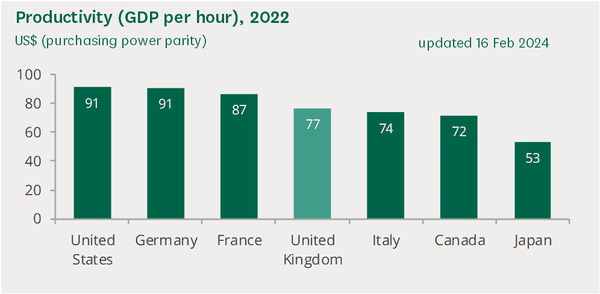
3 Strategies to Improve Productivity for UK Businesses in a Competitive Global Market
As a British technology company, we understand how businesses across different industries have been navigating constant changes and challenges during recent years – not only in a competitive global economy but also both the Brexit and pandemic transitions. These and other macro and micro challenges invariably impact productivity and business efficiency, two concepts we are passionate about helping improve for the success of your business.
We want to share 3 strategies and tools to improve your productivity as a UK business in this competitive global market.
- Implement technology and software that help you in your work
- Focus on what matters
- Embrace change
Background
According to the Office of National Statistics, UK labour productivity fell by 1% in Q4 2023 and has been fluctuating since the coronavirus pandemic. In all of 2023, “productivity was flat, as output per hour showed no growth while output per worker dropped 0.6%” (Office of National Statistics). For context, labour productivity is measured by output per hour worked. When looking at GDP per hour worked, the UK came in 4th out of the G7 countries for productivity (House of Commons Library, 2024). UK productivity was around 16% below the US, Germany and France.

There is a lot to improve here in the UK to fully utilise and empower our workers and businesses, especially if we want to stay competitive and relevant in the global market.
Technology is your friend
When it comes to productivity, technology can eliminate manual and repetitive tasks that we often prefer not to do or completely forget about. One of the main ways this takes place is through automations. By leveraging tools with automation features in employees’ workflows, companies can automate banal processes – freeing up employees to focus on higher-level thinking, creativity, and strategic work.
Sharing work and collaborating through technology enhances team communication and breaks down silos in your workflows. People can collaborate asynchronously as well as at the same time, reducing bottlenecks and ensuring that everyone stays on the same page. In today’s modern economy, team cohesion is essential, and the tools that teams use, greatly impact the degree of cohesion you have.
In conjunction with this, cloud technology is changing the game for project management. Software provides a centralised platform for task allocation, deadline tracking, and progress monitoring. With everything in one place, teams can collaborate effectively, identify potential roadblocks early on, and ensure projects stay on course.
Focus on What Matters
There are so many things that can pull your attention away from your core business. Sometimes it is hard to even identify which aspects of your value chain are essential, and which you could do without. Most often though, menial tasks and side-bar initiatives get in the way of what truly matters in your value proposition.
In today’s global market, staying true to what really matters to you and your business can help push out the noise of the consumerist world trying to distract you from your core mission.
Regularly revisit your company's core purpose – why you exist and the impact you aim to make. Let this guide your decision-making, ensuring every innovation and expansion aligns with your vision. Remember, a strong foundation of authenticity resonates with customers and builds enduring loyalty in a competitive global landscape. One thing that we encourage our team to do in Kinabase, is to always ask if there is a better way to do our work, or if there is anything that is blocking us and think if we need eliminate it. We don’t need to keep doing what is not relevant or necessary anymore. As companies also evolve the tasks and processes need to change and adapt constantly- this mindset fits well with the next point.
Embrace Change
The global market is anything but static. New technologies emerge, customer preferences shift, and economic landscapes evolve. For businesses, the ability to adapt and embrace change is no longer optional – it's essential for survival. But how do you navigate this constant churn without getting capsized?
First, you can embrace change by encouraging a culture of continuous learning within your organisation. This could involve attending industry conferences, subscribing to relevant publications, or even implementing internal knowledge-sharing sessions. By staying informed about trends and developments, your team will be better equipped to identify and capitalise on new opportunities.
Another way to embrace change is to keep an agile mindset about your processes. Even if you aren’t a start up, you can still streamline decision-making and maintain open communication between teams to ensure maximum adaptability and knowledge-sharing. Bureaucracy and rigid structures can stifle innovation and hinder your ability to adapt. An agile mindset will ensure your business is response and proactive to changes in the market.
Conclusion
Don't be afraid to step outside your comfort zone when trying some of these strategies. One thing we know is the global market rewards innovation. Encourage your team to experiment with new ideas, products, and marketing strategies. This doesn't mean every experiment will be great success, but by embracing a "test and learn" mentality, you'll be better positioned to identify winning strategies and differentiate yourself from competitors.
One such experiment we think you’d greatly benefit from is Kinabase. As a flexible business management software, your bases are covered when it comes to cloud-sharing among your teams, project management, agile workflows, and a knack to give you back time to focus on what truly matters through advanced automations. Kinabase can be adapted to fit your business’s specific needs, whether that be a custom CRM, volunteer management database, recruiting platform, inventory management, and more!
We know from our own experience and constant iteration that productivity rises on Kinabase. As a Cambridge-based small business, we want you to succeed in your productivity journey in this competitive, global market.
Sources
- Office of National Statistics. (2024). United Kingdom Productivity. Trading Economics. https://tradingeconomics.com/united-kingdom/productivity#:~:text=Productivity%20in%20the%20United%20Kingdom%20averaged%2076.61%20points%20from%201971,the%20first%20quarter%20of%201971.
- Harari, D. (2024). Productivity: Key Economic Indicators. House of Commons Library Research Briefing. https://commonslibrary.parliament.uk/research-briefings/sn02791/#:~:text=In%202022%2C%20ranked%20on%20GDP,below%20the%20US%20and%20Germany.
Recent Articles

Sleigh Bells and Stock Levels: How a Single Source of Truth Streamlines
Turn seasonal pressure into a plan for durable, data-led advantage for a smoother transition into a smarter Q1.

Data Without the Headache: AI-Powered Insights for Decision-Makers
How AI Reduces Complexity and Enables Smarter, Faster Decisions .

Customising Your Digital System for Long-Term Growth
Utilising the flexibility of Kinabase to track and evolve with business needs.